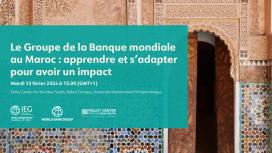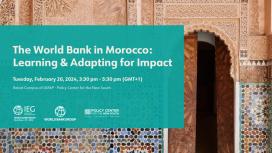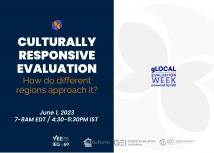Join us at the IEG Symposium "Unlocking the Potential of Geospatial Analysis for Evaluation" to delve into the transformative potential of geospatial data in evaluation. This gathering unites a diverse array of experts, researchers, and practitioners spearheading the frontier of geospatial analysis and its application in evaluation practices.
Objectives
At the symposium, participants will:
- Gain insights into the utilization of geospatial analysis for evaluation;
- Explore successful case studies showcasing the impact of geospatial analysis on evaluation;
- Engage in discussions addressing the challenges and constraints associated with employing geospatial analysis for evaluation;
- Connect with like-minded professionals interested in leveraging geospatial analysis for evaluation.
Intended Audience
This symposium caters to evaluation professionals interested by geospatial analysis and its applications. It welcomes evaluation practitioners, researchers, GIS specialists, remote sensing experts, and data scientists, among others, who are keen to explore the potential of geospatial analysis in the evaluative practice.
Calendar
9:00 AM - 9:15 AM WATCH THE REPLAY
OPENING REMARKS
Sabine Bernabè, Director General, Independent Evaluation Group, World Bank
9:15 AM - 10:30 AM WATCH THE REPLAY
SESSION 1: PANEL DISCUSSION—The Promise of Geospatial Analysis for Evaluation
Chair: Estelle Raimondo, Head, Methods Unit, Independent Evaluation Group, World Bank
Panelists:
- Geospatial Strategy for Evaluations [Download the presentation]
Claire Zanuso, Head of Impact Evaluation Unit, Agence Française de Développement (AFD)
- The Geodata Decision Tree: A Guiding Framework for the Use of Geodata in Evaluation [Download the presentation]
Kai Rompczyk, Evaluator, German Institute for Development Evaluation (DEval)
- Remote Sensing Innovations and Their Role in Shaping the Future of Evaluations [Download the presentation]
Kunwar Singh, Senior Geospatial Scientist, AidData, Global Research Institute, William & Mary
10:45 AM - 12:00 PM WATCH THE REPLAY
SESSION 2: PANEL DISCUSSION—Breaking Ground Using Various Geospatial Techniques to Answer Evaluation Questions
Chair: Estelle Raimondo, Head, Methods Unit, Independent Evaluation Group, World Bank
Panelists:
- From Pixels to Geospatial Insights: IEG’s Experience Leveraging Image Data in Evaluations [Download the presentation]
Virginia Ziulu, Data Scientist, Independent Evaluation Group, World Bank
- Mapping Impact: Leveraging Geospatial Data in Sector Evaluations [Download the presentation]
Maya Vijayaraghavan, Principal Evaluation Specialist, Asian Development Bank (ADB)
1:00 PM - 2:30 PM WATCH THE REPLAY
SESSION 3: LIGHTNING TALKS—Unveiling Innovations in The Use of Remote Sensing for Impact Evaluation
Chair: Alex Chunet, European Space Agency (ESA) Representative to the World Bank
- Setting The Stage: Using Remote Sensing for Monitoring and Impact Evaluation [Download the presentation]
Alex Chunet, European Space Agency (ESA) Representative to the World Bank
A. Using Remote Sensing to Evaluate Climate Initiatives
- Does Irrigation Strengthen Climate Resilience? A Geospatial Impact Evaluation of Interventions in Mali [Download the presentation]
Mascha Rauschenbach, Evaluator, Team Leader, German Institute for Development Evaluation (DEval)
- Geospatial Impact Evaluation of the KfW and the AFD Conservation Portfolio on Forest Cover Loss
Ingrid Dallmann, Impact Evaluation Officer, Agence Française de Développement (AFD) and Melvin Wong, Portfolio Manager, Evaluation Unit, KfW Development Bank
- Beyond the Field Trip: Practical Remote Sensing for Assessing Environment and Climate Interventions [Download the presentation]
Anupam Anand, Senior Evaluation Officer, Independent Evaluation Office, Global Environment Facility (GEF)
2:30 PM - 3:15 PM
SESSION 4: LIGHTNING TALKS
B. Using Remote Sensing to Evaluate Urban Development and Conflict Prevention Initiatives
Chair: Victor Vergara, Fellow, Special Program for Urban and Regional Studies, Massachusetts Institute of Technology
- Urban Sustainability Index: Leveraging Geospatial Analysis to Monitor Environmental and Economic Performance.
Alexander Stepanov, Principal Economist, and Maximilian Reinke, Economist, European Bank for Reconstruction and Development (EBRD)
- Landmine Clearance and Economic Development: Evidence from Nighttime Lights, Multispectral Satellite Imagery, and Conflict Events in Afghanistan [Download the presentation]
Rachel Sayers, Research Scientist, AidData, William & Mary
3:15 PM - 3:30 PM
CLOSING REMARKS
Estelle Raimondo, Head, Methods Unit, Independent Evaluation Group, World Bank
3:45 PM - 4:45 PM
Invitation-only session
Towards a Community of Practice – This closed-door discussion will cover skills, data and quality control, collaboration areas, as well as more advanced Artificial Intelligence and Deep Learning topics.
Speakers
 Alex Chunet is the European Space Agency Representative to the World Bank, hosted at GFDRR, and supports the coordination of collaborative activities under the ESA partnership and the joint Space for International Development Assistance initiative across the World Bank. He previously worked for the World Bank from 2017 to 2020 as a geospatial data scientist and contributed to the deployment of earth observation technologies and their application and adoption within World Bank operations and analytical pieces. Subsequently, he also led the development of the first geospatial strategy of the Agence Française de Développement (AFD). He holds a Master of Science from the London School of Economics, a Master’s in public management from Sciences Po Paris, and has completed trainings from the MIT, the French Space Agency, and EUMETSAT in Data Science and Earth Observation technologies.
Alex Chunet is the European Space Agency Representative to the World Bank, hosted at GFDRR, and supports the coordination of collaborative activities under the ESA partnership and the joint Space for International Development Assistance initiative across the World Bank. He previously worked for the World Bank from 2017 to 2020 as a geospatial data scientist and contributed to the deployment of earth observation technologies and their application and adoption within World Bank operations and analytical pieces. Subsequently, he also led the development of the first geospatial strategy of the Agence Française de Développement (AFD). He holds a Master of Science from the London School of Economics, a Master’s in public management from Sciences Po Paris, and has completed trainings from the MIT, the French Space Agency, and EUMETSAT in Data Science and Earth Observation technologies.
 Alexander Stepanov is a Principal Economist at the European Bank for Reconstruction and Development (EBRD). Alexander has extensive experience in conducting evaluations of EBRD operations in the areas of sustainable infrastructure, business support, and crises response. He currently leads an impact assessment of the EBRD Green Cities Programme, which leverages geospatial analysis to estimate environmental and economic impact of EBRD projects. Prior to his current role, Alexander had worked as a research economist with his main research interests covering evaluation of public policies and state interventions in the areas of innovation, green growth and finance. Alexander holds a masters’ degree in international economic policy from Sciences Po, France and a master's degree in computer science.
Alexander Stepanov is a Principal Economist at the European Bank for Reconstruction and Development (EBRD). Alexander has extensive experience in conducting evaluations of EBRD operations in the areas of sustainable infrastructure, business support, and crises response. He currently leads an impact assessment of the EBRD Green Cities Programme, which leverages geospatial analysis to estimate environmental and economic impact of EBRD projects. Prior to his current role, Alexander had worked as a research economist with his main research interests covering evaluation of public policies and state interventions in the areas of innovation, green growth and finance. Alexander holds a masters’ degree in international economic policy from Sciences Po, France and a master's degree in computer science.
 Anupam Anand, Senior Evaluation Officer at the GEF IEO, has more than 15 years of combined experience in evaluation, international development, and academia. He uses a blend of innovative mixed-method approaches and tools such as satellite data, GIS, machine learning, computational social science, UAVs, and field-based methods to enhance evaluative evidence and knowledge products. Anupam has led evaluations on biodiversity, SFM and REDD+, land degradation, fragility and conflict, and illegal wildlife trade. Previously, as a Remote Sensing Scientist at the University of Maryland, he worked on multiple NASA-funded projects, including field campaigns for future satellite missions. He also consulted for the Climate Investment Funds, World Bank. Anupam has contributed to more than thirty peer-reviewed articles and book chapters on remote sensing, evaluation, and environmental policy. He holds a Ph.D. in Geospatial Science from the University of Maryland and a postgraduate diploma in Environmental Law and Policy.
Anupam Anand, Senior Evaluation Officer at the GEF IEO, has more than 15 years of combined experience in evaluation, international development, and academia. He uses a blend of innovative mixed-method approaches and tools such as satellite data, GIS, machine learning, computational social science, UAVs, and field-based methods to enhance evaluative evidence and knowledge products. Anupam has led evaluations on biodiversity, SFM and REDD+, land degradation, fragility and conflict, and illegal wildlife trade. Previously, as a Remote Sensing Scientist at the University of Maryland, he worked on multiple NASA-funded projects, including field campaigns for future satellite missions. He also consulted for the Climate Investment Funds, World Bank. Anupam has contributed to more than thirty peer-reviewed articles and book chapters on remote sensing, evaluation, and environmental policy. He holds a Ph.D. in Geospatial Science from the University of Maryland and a postgraduate diploma in Environmental Law and Policy.
 Claire Zanuso is the head of the impact evaluation team at the Agence Française de Développement (AFD). Claire joined AFD in 2016 and has promoted Geospatial Impact Evaluations (GIEs) in the agency's evaluation portfolio. She holds a PhD from Paris-Dauphine University, specializing in development economics. Her current work focuses on labour market issues, youth aspirations, and impact evaluations of sustainable infrastructure in developing countries.
Claire Zanuso is the head of the impact evaluation team at the Agence Française de Développement (AFD). Claire joined AFD in 2016 and has promoted Geospatial Impact Evaluations (GIEs) in the agency's evaluation portfolio. She holds a PhD from Paris-Dauphine University, specializing in development economics. Her current work focuses on labour market issues, youth aspirations, and impact evaluations of sustainable infrastructure in developing countries.
 Estelle Raimondo is the Head of the Methods Unit at the World Bank’s Independent Evaluation Group. She is an internationally recognized expert on evaluation methodologies, has advised governments and international organizations on evaluation systems and published extensively on the topic. She is a faculty member of the International Program for Development Evaluation Training (IPDET), serves on the board of the European Evaluation Society and on the College of experts of the French Evaluation Commission on Official Development Assistance. She received her PhD in evaluation research from the George Washington University.
Estelle Raimondo is the Head of the Methods Unit at the World Bank’s Independent Evaluation Group. She is an internationally recognized expert on evaluation methodologies, has advised governments and international organizations on evaluation systems and published extensively on the topic. She is a faculty member of the International Program for Development Evaluation Training (IPDET), serves on the board of the European Evaluation Society and on the College of experts of the French Evaluation Commission on Official Development Assistance. She received her PhD in evaluation research from the George Washington University.
 Ingrid Dallmann is an Impact Evaluation officer at the Evaluation and Learning division of the Agence Française du Développement (AFD). In the AFD, she evaluates projects focused on the climate, biodiversity and transport sectors. She also cooperates in the application of geospatial data in project evaluations. She holds a PhD in Economics from the Paris-Saclay University and has focused her research on the impact of climate change on several socio-economic factors.
Ingrid Dallmann is an Impact Evaluation officer at the Evaluation and Learning division of the Agence Française du Développement (AFD). In the AFD, she evaluates projects focused on the climate, biodiversity and transport sectors. She also cooperates in the application of geospatial data in project evaluations. She holds a PhD in Economics from the Paris-Saclay University and has focused her research on the impact of climate change on several socio-economic factors.
 Kai Rompczyk is an evaluator at the German Institute for Development Evaluation (DEval) and has a background in empirical social research. At DEval, he is part of the Competence Center for Evaluation Methodology. In his work, he contributes to the upscaling of digital evaluation methods, such as geospatial data analysis or text mining, and the implementation of evaluation standards through a community of practice approach. Kunwar Singh, a Senior Geospatial Scientist at the Global Research Institute and Affiliate Faculty at William & Mary's Center for Geospatial Analysis, spearheads interdisciplinary research at the nexus of land change, geospatial sciences, and geospatial impact evaluation.
Kai Rompczyk is an evaluator at the German Institute for Development Evaluation (DEval) and has a background in empirical social research. At DEval, he is part of the Competence Center for Evaluation Methodology. In his work, he contributes to the upscaling of digital evaluation methods, such as geospatial data analysis or text mining, and the implementation of evaluation standards through a community of practice approach. Kunwar Singh, a Senior Geospatial Scientist at the Global Research Institute and Affiliate Faculty at William & Mary's Center for Geospatial Analysis, spearheads interdisciplinary research at the nexus of land change, geospatial sciences, and geospatial impact evaluation.
 Kunwar Singh explores how terrestrial systems cope with upcoming changes in land and natural resource use, especially with climate change. He emphasizes the urgent importance of balancing land conversions with preserving natural resources, especially as the world's population grows and resource needs rise. Kunwar Singh studies alterations in land and vegetation patterns, understanding their ecological and environmental repercussions. He evaluates the efficacy of restoration, conservation, and climate-smart agricultural practices in counteracting climate change's adverse impacts on natural resource sustainability. Utilizing geospatial impact evaluation, Dr. Singh analyzes the outcomes of interventions like wetland restoration, climate-smart agricultural, and reforestation. His efforts aim to inform decision-making and champion sustainable development practices to tackle the complex challenges posed by land conversions and climate variability, especially in countries like sub-Saharan and South Asia. Currently, he co-leads the GeoField initiative, funded by the Bill & Melinda Gates Foundation.
Kunwar Singh explores how terrestrial systems cope with upcoming changes in land and natural resource use, especially with climate change. He emphasizes the urgent importance of balancing land conversions with preserving natural resources, especially as the world's population grows and resource needs rise. Kunwar Singh studies alterations in land and vegetation patterns, understanding their ecological and environmental repercussions. He evaluates the efficacy of restoration, conservation, and climate-smart agricultural practices in counteracting climate change's adverse impacts on natural resource sustainability. Utilizing geospatial impact evaluation, Dr. Singh analyzes the outcomes of interventions like wetland restoration, climate-smart agricultural, and reforestation. His efforts aim to inform decision-making and champion sustainable development practices to tackle the complex challenges posed by land conversions and climate variability, especially in countries like sub-Saharan and South Asia. Currently, he co-leads the GeoField initiative, funded by the Bill & Melinda Gates Foundation.
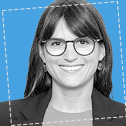 Mascha Rauschenbach is an evaluator and team leader at the German Institute for Development Evaluation (DEval). She has been conducting evaluations on climate change and energy access and has done research on elections and conflict in Sub-Saharan Africa.
Mascha Rauschenbach is an evaluator and team leader at the German Institute for Development Evaluation (DEval). She has been conducting evaluations on climate change and energy access and has done research on elections and conflict in Sub-Saharan Africa.
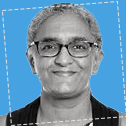 Maya Vijayaraghavan is an experienced economist and evaluator with a PhD in applied economics from Clemson University. She currently advises on evaluation methods and leads innovation initiatives at the Independent Evaluation Department (IED) of the Asian Development Bank (ADB). Maya has previously led IED’s evaluation capacity development initiatives, including the flagship Asian Evaluation Week and the Shanghai International Program for Development Evaluation Training (SHIPDET). Early in her career with IED, she evaluated ADB’s policies, strategies, and operations at the thematic, country, sector, and project levels. Before joining ADB, Maya spent most of her career as a civil servant with the US federal government, where she worked as a Lead Economist at the Centers for Disease Control and Prevention in Atlanta. In this role, she led impact and economic evaluations of international health programs at global, regional, and country levels. Maya has also worked as an econometrician with the World Bank Group in Washington, D.C. Throughout her career, Maya has authored numerous peer-reviewed publications and has frequently spoken at professional meetings.
Maya Vijayaraghavan is an experienced economist and evaluator with a PhD in applied economics from Clemson University. She currently advises on evaluation methods and leads innovation initiatives at the Independent Evaluation Department (IED) of the Asian Development Bank (ADB). Maya has previously led IED’s evaluation capacity development initiatives, including the flagship Asian Evaluation Week and the Shanghai International Program for Development Evaluation Training (SHIPDET). Early in her career with IED, she evaluated ADB’s policies, strategies, and operations at the thematic, country, sector, and project levels. Before joining ADB, Maya spent most of her career as a civil servant with the US federal government, where she worked as a Lead Economist at the Centers for Disease Control and Prevention in Atlanta. In this role, she led impact and economic evaluations of international health programs at global, regional, and country levels. Maya has also worked as an econometrician with the World Bank Group in Washington, D.C. Throughout her career, Maya has authored numerous peer-reviewed publications and has frequently spoken at professional meetings.
 Maximilian Reinke is an Economist at the European Bank for Reconstruction and Development (EBRD) where he works on impact assessments of the Bank’s operations and foresight studies to inform its impact strategy. Covering a wide range of innovative evaluation methods, his team uses geospatial data to analyse urban environmental and economic performance at scale. Prior to EBRD, Maximilian was a Consultant at the International Finance Corporation (IFC) where he specialized in the appraisal of investment projects in the manufacturing and agribusiness sector. Maximilian holds graduate degrees in Economics from the University of Göttingen, Germany, and Stellenbosch University, South Africa.
Maximilian Reinke is an Economist at the European Bank for Reconstruction and Development (EBRD) where he works on impact assessments of the Bank’s operations and foresight studies to inform its impact strategy. Covering a wide range of innovative evaluation methods, his team uses geospatial data to analyse urban environmental and economic performance at scale. Prior to EBRD, Maximilian was a Consultant at the International Finance Corporation (IFC) where he specialized in the appraisal of investment projects in the manufacturing and agribusiness sector. Maximilian holds graduate degrees in Economics from the University of Göttingen, Germany, and Stellenbosch University, South Africa.
 Melvin Wong is a development economist and works for KfW’s Evaluation department as portfolio manager. His work focuses on evaluating development projects in forest conservation and leading research within KfW’s Development Impact Lab. His research focuses on the use of geo-spatial analysis of protected areas and armed conflicts. Before joining KfW he was a Junior Professional Officer (JPO) in DECRG at the World Bank.
Melvin Wong is a development economist and works for KfW’s Evaluation department as portfolio manager. His work focuses on evaluating development projects in forest conservation and leading research within KfW’s Development Impact Lab. His research focuses on the use of geo-spatial analysis of protected areas and armed conflicts. Before joining KfW he was a Junior Professional Officer (JPO) in DECRG at the World Bank.
 Rachel Sayers is a development economist specializing in geospatial methods, human capital, and household economics. She is a Research Scientist at AidData's Research and Evaluation Unit, where she conducts impact evaluations on a number of development topics. She combines econometric and GIS analysis methods to design and conduct rigorous evaluations with an emphasis on causal identification. Her primary research interests are labor markets, human capital, household bargaining, and gender. She also co-created AidData's Gender Equity in Development initiative, which focuses on bringing AidData's geospatial and research expertise to the gender space. She completed her Ph.D. in Economics at Duke University.
Rachel Sayers is a development economist specializing in geospatial methods, human capital, and household economics. She is a Research Scientist at AidData's Research and Evaluation Unit, where she conducts impact evaluations on a number of development topics. She combines econometric and GIS analysis methods to design and conduct rigorous evaluations with an emphasis on causal identification. Her primary research interests are labor markets, human capital, household bargaining, and gender. She also co-created AidData's Gender Equity in Development initiative, which focuses on bringing AidData's geospatial and research expertise to the gender space. She completed her Ph.D. in Economics at Duke University.
 Victor Vergara is former lead urban specialist at the World Bank, he led evaluations in urban resilience, spatial growth, finance, and waste management, implementing changes in 30 countries across Latin America, Africa, and Asia since 1991. He holds Bachelor of Science on Water Resources from University of Maryland; Master of Agriculture from Texas A&M University; and Master of City Planning from Massachusetts Institute of Technology. Post-World Bank, he aims to address climate change and rapid urbanization by exploring sustainable urban development focused on low-income areas, seeking new institutional and technical solutions while updating his knowledge on current urban development debates.
Victor Vergara is former lead urban specialist at the World Bank, he led evaluations in urban resilience, spatial growth, finance, and waste management, implementing changes in 30 countries across Latin America, Africa, and Asia since 1991. He holds Bachelor of Science on Water Resources from University of Maryland; Master of Agriculture from Texas A&M University; and Master of City Planning from Massachusetts Institute of Technology. Post-World Bank, he aims to address climate change and rapid urbanization by exploring sustainable urban development focused on low-income areas, seeking new institutional and technical solutions while updating his knowledge on current urban development debates.
 Virginia Ziulu is a Data Scientist in IEG’s Methods Advisory unit. She specializes in complex data science applications at the intersection between computer vision and geospatial analysis. She also has extensive experience in the application of machine learning and natural language processing techniques. Virginia has a background in data science with postgraduate studies completed at the University of Oxford and the University of Edinburgh.
Virginia Ziulu is a Data Scientist in IEG’s Methods Advisory unit. She specializes in complex data science applications at the intersection between computer vision and geospatial analysis. She also has extensive experience in the application of machine learning and natural language processing techniques. Virginia has a background in data science with postgraduate studies completed at the University of Oxford and the University of Edinburgh.



 Alex Chunet is the European Space Agency Representative to the World Bank, hosted at GFDRR, and supports the coordination of collaborative activities under the ESA partnership and the joint Space for International Development Assistance initiative across the World Bank. He previously worked for the World Bank from 2017 to 2020 as a geospatial data scientist and contributed to the deployment of earth observation technologies and their application and adoption within World Bank operations and analytical pieces. Subsequently, he also led the development of the first geospatial strategy of the Agence Française de Développement (AFD). He holds a Master of Science from the London School of Economics, a Master’s in public management from Sciences Po Paris, and has completed trainings from the MIT, the French Space Agency, and EUMETSAT in Data Science and Earth Observation technologies.
Alex Chunet is the European Space Agency Representative to the World Bank, hosted at GFDRR, and supports the coordination of collaborative activities under the ESA partnership and the joint Space for International Development Assistance initiative across the World Bank. He previously worked for the World Bank from 2017 to 2020 as a geospatial data scientist and contributed to the deployment of earth observation technologies and their application and adoption within World Bank operations and analytical pieces. Subsequently, he also led the development of the first geospatial strategy of the Agence Française de Développement (AFD). He holds a Master of Science from the London School of Economics, a Master’s in public management from Sciences Po Paris, and has completed trainings from the MIT, the French Space Agency, and EUMETSAT in Data Science and Earth Observation technologies. Alexander Stepanov is a Principal Economist at the European Bank for Reconstruction and Development (EBRD). Alexander has extensive experience in conducting evaluations of EBRD operations in the areas of sustainable infrastructure, business support, and crises response. He currently leads an impact assessment of the EBRD Green Cities Programme, which leverages geospatial analysis to estimate environmental and economic impact of EBRD projects. Prior to his current role, Alexander had worked as a research economist with his main research interests covering evaluation of public policies and state interventions in the areas of innovation, green growth and finance. Alexander holds a masters’ degree in international economic policy from Sciences Po, France and a master's degree in computer science.
Alexander Stepanov is a Principal Economist at the European Bank for Reconstruction and Development (EBRD). Alexander has extensive experience in conducting evaluations of EBRD operations in the areas of sustainable infrastructure, business support, and crises response. He currently leads an impact assessment of the EBRD Green Cities Programme, which leverages geospatial analysis to estimate environmental and economic impact of EBRD projects. Prior to his current role, Alexander had worked as a research economist with his main research interests covering evaluation of public policies and state interventions in the areas of innovation, green growth and finance. Alexander holds a masters’ degree in international economic policy from Sciences Po, France and a master's degree in computer science. Anupam Anand, Senior Evaluation Officer at the GEF IEO, has more than 15 years of combined experience in evaluation, international development, and academia. He uses a blend of innovative mixed-method approaches and tools such as satellite data, GIS, machine learning, computational social science, UAVs, and field-based methods to enhance evaluative evidence and knowledge products. Anupam has led evaluations on biodiversity, SFM and REDD+, land degradation, fragility and conflict, and illegal wildlife trade. Previously, as a Remote Sensing Scientist at the University of Maryland, he worked on multiple NASA-funded projects, including field campaigns for future satellite missions. He also consulted for the Climate Investment Funds, World Bank. Anupam has contributed to more than thirty peer-reviewed articles and book chapters on remote sensing, evaluation, and environmental policy. He holds a Ph.D. in Geospatial Science from the University of Maryland and a postgraduate diploma in Environmental Law and Policy.
Anupam Anand, Senior Evaluation Officer at the GEF IEO, has more than 15 years of combined experience in evaluation, international development, and academia. He uses a blend of innovative mixed-method approaches and tools such as satellite data, GIS, machine learning, computational social science, UAVs, and field-based methods to enhance evaluative evidence and knowledge products. Anupam has led evaluations on biodiversity, SFM and REDD+, land degradation, fragility and conflict, and illegal wildlife trade. Previously, as a Remote Sensing Scientist at the University of Maryland, he worked on multiple NASA-funded projects, including field campaigns for future satellite missions. He also consulted for the Climate Investment Funds, World Bank. Anupam has contributed to more than thirty peer-reviewed articles and book chapters on remote sensing, evaluation, and environmental policy. He holds a Ph.D. in Geospatial Science from the University of Maryland and a postgraduate diploma in Environmental Law and Policy. Claire Zanuso is the head of the impact evaluation team at the Agence Française de Développement (AFD). Claire joined AFD in 2016 and has promoted Geospatial Impact Evaluations (GIEs) in the agency's evaluation portfolio. She holds a PhD from Paris-Dauphine University, specializing in development economics. Her current work focuses on labour market issues, youth aspirations, and impact evaluations of sustainable infrastructure in developing countries.
Claire Zanuso is the head of the impact evaluation team at the Agence Française de Développement (AFD). Claire joined AFD in 2016 and has promoted Geospatial Impact Evaluations (GIEs) in the agency's evaluation portfolio. She holds a PhD from Paris-Dauphine University, specializing in development economics. Her current work focuses on labour market issues, youth aspirations, and impact evaluations of sustainable infrastructure in developing countries. Estelle Raimondo is the Head of the Methods Unit at the World Bank’s Independent Evaluation Group. She is an internationally recognized expert on evaluation methodologies, has advised governments and international organizations on evaluation systems and published extensively on the topic. She is a faculty member of the International Program for Development Evaluation Training (IPDET), serves on the board of the European Evaluation Society and on the College of experts of the French Evaluation Commission on Official Development Assistance. She received her PhD in evaluation research from the George Washington University.
Estelle Raimondo is the Head of the Methods Unit at the World Bank’s Independent Evaluation Group. She is an internationally recognized expert on evaluation methodologies, has advised governments and international organizations on evaluation systems and published extensively on the topic. She is a faculty member of the International Program for Development Evaluation Training (IPDET), serves on the board of the European Evaluation Society and on the College of experts of the French Evaluation Commission on Official Development Assistance. She received her PhD in evaluation research from the George Washington University. Ingrid Dallmann is an Impact Evaluation officer at the Evaluation and Learning division of the Agence Française du Développement (AFD). In the AFD, she evaluates projects focused on the climate, biodiversity and transport sectors. She also cooperates in the application of geospatial data in project evaluations. She holds a PhD in Economics from the Paris-Saclay University and has focused her research on the impact of climate change on several socio-economic factors.
Ingrid Dallmann is an Impact Evaluation officer at the Evaluation and Learning division of the Agence Française du Développement (AFD). In the AFD, she evaluates projects focused on the climate, biodiversity and transport sectors. She also cooperates in the application of geospatial data in project evaluations. She holds a PhD in Economics from the Paris-Saclay University and has focused her research on the impact of climate change on several socio-economic factors. Kai Rompczyk is an evaluator at the German Institute for Development Evaluation (DEval) and has a background in empirical social research. At DEval, he is part of the Competence Center for Evaluation Methodology. In his work, he contributes to the upscaling of digital evaluation methods, such as geospatial data analysis or text mining, and the implementation of evaluation standards through a community of practice approach. Kunwar Singh, a Senior Geospatial Scientist at the Global Research Institute and Affiliate Faculty at William & Mary's Center for Geospatial Analysis, spearheads interdisciplinary research at the nexus of land change, geospatial sciences, and geospatial impact evaluation.
Kai Rompczyk is an evaluator at the German Institute for Development Evaluation (DEval) and has a background in empirical social research. At DEval, he is part of the Competence Center for Evaluation Methodology. In his work, he contributes to the upscaling of digital evaluation methods, such as geospatial data analysis or text mining, and the implementation of evaluation standards through a community of practice approach. Kunwar Singh, a Senior Geospatial Scientist at the Global Research Institute and Affiliate Faculty at William & Mary's Center for Geospatial Analysis, spearheads interdisciplinary research at the nexus of land change, geospatial sciences, and geospatial impact evaluation. Kunwar Singh explores how terrestrial systems cope with upcoming changes in land and natural resource use, especially with climate change. He emphasizes the urgent importance of balancing land conversions with preserving natural resources, especially as the world's population grows and resource needs rise. Kunwar Singh studies alterations in land and vegetation patterns, understanding their ecological and environmental repercussions. He evaluates the efficacy of restoration, conservation, and climate-smart agricultural practices in counteracting climate change's adverse impacts on natural resource sustainability. Utilizing geospatial impact evaluation, Dr. Singh analyzes the outcomes of interventions like wetland restoration, climate-smart agricultural, and reforestation. His efforts aim to inform decision-making and champion sustainable development practices to tackle the complex challenges posed by land conversions and climate variability, especially in countries like sub-Saharan and South Asia. Currently, he co-leads the GeoField initiative, funded by the Bill & Melinda Gates Foundation.
Kunwar Singh explores how terrestrial systems cope with upcoming changes in land and natural resource use, especially with climate change. He emphasizes the urgent importance of balancing land conversions with preserving natural resources, especially as the world's population grows and resource needs rise. Kunwar Singh studies alterations in land and vegetation patterns, understanding their ecological and environmental repercussions. He evaluates the efficacy of restoration, conservation, and climate-smart agricultural practices in counteracting climate change's adverse impacts on natural resource sustainability. Utilizing geospatial impact evaluation, Dr. Singh analyzes the outcomes of interventions like wetland restoration, climate-smart agricultural, and reforestation. His efforts aim to inform decision-making and champion sustainable development practices to tackle the complex challenges posed by land conversions and climate variability, especially in countries like sub-Saharan and South Asia. Currently, he co-leads the GeoField initiative, funded by the Bill & Melinda Gates Foundation. Mascha Rauschenbach is an evaluator and team leader at the German Institute for Development Evaluation (DEval). She has been conducting evaluations on climate change and energy access and has done research on elections and conflict in Sub-Saharan Africa.
Mascha Rauschenbach is an evaluator and team leader at the German Institute for Development Evaluation (DEval). She has been conducting evaluations on climate change and energy access and has done research on elections and conflict in Sub-Saharan Africa. Maya Vijayaraghavan is an experienced economist and evaluator with a PhD in applied economics from Clemson University. She currently advises on evaluation methods and leads innovation initiatives at the Independent Evaluation Department (IED) of the Asian Development Bank (ADB). Maya has previously led IED’s evaluation capacity development initiatives, including the flagship Asian Evaluation Week and the Shanghai International Program for Development Evaluation Training (SHIPDET). Early in her career with IED, she evaluated ADB’s policies, strategies, and operations at the thematic, country, sector, and project levels. Before joining ADB, Maya spent most of her career as a civil servant with the US federal government, where she worked as a Lead Economist at the Centers for Disease Control and Prevention in Atlanta. In this role, she led impact and economic evaluations of international health programs at global, regional, and country levels. Maya has also worked as an econometrician with the World Bank Group in Washington, D.C. Throughout her career, Maya has authored numerous peer-reviewed publications and has frequently spoken at professional meetings.
Maya Vijayaraghavan is an experienced economist and evaluator with a PhD in applied economics from Clemson University. She currently advises on evaluation methods and leads innovation initiatives at the Independent Evaluation Department (IED) of the Asian Development Bank (ADB). Maya has previously led IED’s evaluation capacity development initiatives, including the flagship Asian Evaluation Week and the Shanghai International Program for Development Evaluation Training (SHIPDET). Early in her career with IED, she evaluated ADB’s policies, strategies, and operations at the thematic, country, sector, and project levels. Before joining ADB, Maya spent most of her career as a civil servant with the US federal government, where she worked as a Lead Economist at the Centers for Disease Control and Prevention in Atlanta. In this role, she led impact and economic evaluations of international health programs at global, regional, and country levels. Maya has also worked as an econometrician with the World Bank Group in Washington, D.C. Throughout her career, Maya has authored numerous peer-reviewed publications and has frequently spoken at professional meetings. Maximilian Reinke is an Economist at the European Bank for Reconstruction and Development (EBRD) where he works on impact assessments of the Bank’s operations and foresight studies to inform its impact strategy. Covering a wide range of innovative evaluation methods, his team uses geospatial data to analyse urban environmental and economic performance at scale. Prior to EBRD, Maximilian was a Consultant at the International Finance Corporation (IFC) where he specialized in the appraisal of investment projects in the manufacturing and agribusiness sector. Maximilian holds graduate degrees in Economics from the University of Göttingen, Germany, and Stellenbosch University, South Africa.
Maximilian Reinke is an Economist at the European Bank for Reconstruction and Development (EBRD) where he works on impact assessments of the Bank’s operations and foresight studies to inform its impact strategy. Covering a wide range of innovative evaluation methods, his team uses geospatial data to analyse urban environmental and economic performance at scale. Prior to EBRD, Maximilian was a Consultant at the International Finance Corporation (IFC) where he specialized in the appraisal of investment projects in the manufacturing and agribusiness sector. Maximilian holds graduate degrees in Economics from the University of Göttingen, Germany, and Stellenbosch University, South Africa. Melvin Wong is a development economist and works for KfW’s Evaluation department as portfolio manager. His work focuses on evaluating development projects in forest conservation and leading research within KfW’s Development Impact Lab. His research focuses on the use of geo-spatial analysis of protected areas and armed conflicts. Before joining KfW he was a Junior Professional Officer (JPO) in DECRG at the World Bank.
Melvin Wong is a development economist and works for KfW’s Evaluation department as portfolio manager. His work focuses on evaluating development projects in forest conservation and leading research within KfW’s Development Impact Lab. His research focuses on the use of geo-spatial analysis of protected areas and armed conflicts. Before joining KfW he was a Junior Professional Officer (JPO) in DECRG at the World Bank. Rachel Sayers is a development economist specializing in geospatial methods, human capital, and household economics. She is a Research Scientist at AidData's Research and Evaluation Unit, where she conducts impact evaluations on a number of development topics. She combines econometric and GIS analysis methods to design and conduct rigorous evaluations with an emphasis on causal identification. Her primary research interests are labor markets, human capital, household bargaining, and gender. She also co-created AidData's Gender Equity in Development initiative, which focuses on bringing AidData's geospatial and research expertise to the gender space. She completed her Ph.D. in Economics at Duke University.
Rachel Sayers is a development economist specializing in geospatial methods, human capital, and household economics. She is a Research Scientist at AidData's Research and Evaluation Unit, where she conducts impact evaluations on a number of development topics. She combines econometric and GIS analysis methods to design and conduct rigorous evaluations with an emphasis on causal identification. Her primary research interests are labor markets, human capital, household bargaining, and gender. She also co-created AidData's Gender Equity in Development initiative, which focuses on bringing AidData's geospatial and research expertise to the gender space. She completed her Ph.D. in Economics at Duke University. Victor Vergara is former lead urban specialist at the World Bank, he led evaluations in urban resilience, spatial growth, finance, and waste management, implementing changes in 30 countries across Latin America, Africa, and Asia since 1991. He holds Bachelor of Science on Water Resources from University of Maryland; Master of Agriculture from Texas A&M University; and Master of City Planning from Massachusetts Institute of Technology. Post-World Bank, he aims to address climate change and rapid urbanization by exploring sustainable urban development focused on low-income areas, seeking new institutional and technical solutions while updating his knowledge on current urban development debates.
Victor Vergara is former lead urban specialist at the World Bank, he led evaluations in urban resilience, spatial growth, finance, and waste management, implementing changes in 30 countries across Latin America, Africa, and Asia since 1991. He holds Bachelor of Science on Water Resources from University of Maryland; Master of Agriculture from Texas A&M University; and Master of City Planning from Massachusetts Institute of Technology. Post-World Bank, he aims to address climate change and rapid urbanization by exploring sustainable urban development focused on low-income areas, seeking new institutional and technical solutions while updating his knowledge on current urban development debates.  Virginia Ziulu is a Data Scientist in IEG’s Methods Advisory unit. She specializes in complex data science applications at the intersection between computer vision and geospatial analysis. She also has extensive experience in the application of machine learning and natural language processing techniques. Virginia has a background in data science with postgraduate studies completed at the University of Oxford and the University of Edinburgh.
Virginia Ziulu is a Data Scientist in IEG’s Methods Advisory unit. She specializes in complex data science applications at the intersection between computer vision and geospatial analysis. She also has extensive experience in the application of machine learning and natural language processing techniques. Virginia has a background in data science with postgraduate studies completed at the University of Oxford and the University of Edinburgh.

